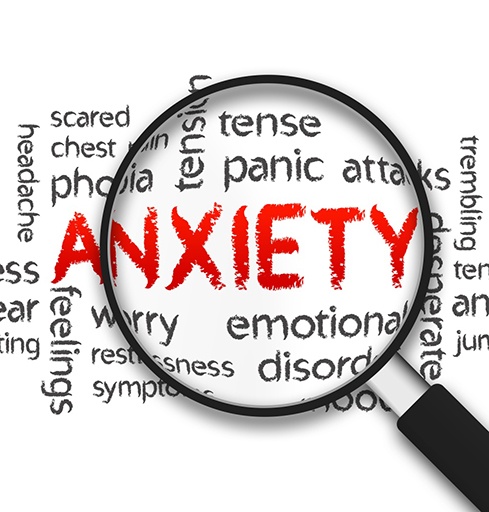Anxiety Disorders – Westfield, NJ
Strive for a Calmer Life
Untreated anxiety can be a major obstacle to a happy and fulfilling existence. It can interfere with daily activities, have an impact on your relationships, and prevent you from reaching your potential. The good news is that treatments for anxiety disorders are available in our Westfield psychiatric office. To learn more about anxiety and how our team can help you strive for a calmer life, read this page. Then, get in touch with us to schedule your initial appointment.

Why Choose Embrace Psychiatric Wellness Center for Treatment for Anxiety Disorders?
- Board-Certified Psychiatrist
- Compassionate Team of Mental Health Professionals
- Effective Treatment Options
What Is Anxiety?

Anxiety is a sense of worry, nervousness, restlessness, or even fear. It affects people in different ways and can have a range of triggers. Virtually everyone experiences anxiety at some point in their life, whether it is due to a stressful family situation, a test, or other trying circumstances. Such anxiety is normal and usually not something to be concerned about.
However, when anxiety reaches the point where it consistently interferes with a person’s quality of life, it may be classified as a mental health disorder that requires treatment.
Types of Anxiety Disorders

There are several disorders that involve feeling of anxiety. Here are examples of some of the most common:
- Generalized anxiety disorder. This involves persistent worry and other symptoms that interfere with everyday activities.
- Panic disorder. An individual with panic disorder regularly suffers from panic attacks, which can be accompanied by severe physical symptoms. In some cases, victims have even confused a panic attack with a heart attack.
- Social anxiety disorder. People with this condition find it difficult to be around others due to a fear of embarrassment, rejection, or being looked down on.
- Obsessive-compulsive disorder (OCD). OCD leads to unreasonable thoughts and worries. Individuals with this condition often try to manage their feelings through various rituals.
- A phobia is an irrational and excessive fear of a specific activity, object, or situation.
Treatment Options for Anxiety Disorders

The best treatment for an anxiety disorder depends on the nature and severity of an individual’s condition. If you are struggling with anxiety, our team will perform a thorough mental health evaluation before we recommend your next steps. We might determine that you need:
- Often, speaking to a qualified mental health professional can help anxiety-ridden individuals to manage their feelings. Counselors and therapists are excellent at providing suggestions on coping mechanisms.
- There are a number of medications that have been shown to help individuals with anxiety disorders to remain calm and function better in their daily lives. For example, some antidepressants are often used as a treatment for anxiety.
- Lifestyle adjustments. Sticking to healthy habits, such as eating a nutritious diet and getting enough exercise, can often do much to alleviate anxiety.
Are you engaged in a battle against anxiety? You don’t have to go it alone. Our team of Mental Health Professionals at Embrace Psychiatric Wellness Center are ready to serve you.
Anxiety Disorders FAQs

While occasional anxiety is a common experience, anxiety disorders go beyond temporary worry or fear. For those affected, anxiety persists and can intensify over time, significantly impacting daily life. Tasks like work, school, and relationships may be affected. Below, you can learn more about anxiety disorders and find answers to some of the most frequently asked questions.
How Are Anxiety Disorders Diagnosed?
Anxiety disorders are typically diagnosed by primary care physicians or psychiatrists based on specific criteria. To receive a diagnosis, symptoms must persist for at least six months on more days than not, and significantly affect the individual's ability to function in their daily life, whether at home, work, or school.
Medical professionals conduct thorough physical and psychological evaluations to ensure that the symptoms are indeed related to an anxiety disorder. This process helps rule out other potential causes, such as cardiovascular disease, thyroid issues, menopause, substance abuse, or side effects from medications like steroids. These conditions can produce symptoms similar to those of an anxiety disorder, and it's crucial to differentiate between them for an accurate diagnosis and appropriate treatment.
What Causes Anxiety Disorders?
Anxiety disorders have several underlying causes. Researchers have found that they tend to have a familial link and are rooted in biology, similar to conditions like allergies or diabetes. These disorders can arise from a combination of factors, including genetics, brain chemistry, individual personality traits, and life experiences. It's important to recognize that anxiety disorders are complex and can result from a combination of these risk factors, making each person's experience unique.
What Treatment Options Are Available?
Treatment options for anxiety disorders include both medication and therapy, both of which have demonstrated effectiveness. In some cases, a combination of both approaches can yield positive results. The choice of treatment depends on your specific needs and preferences. It's important to engage in a thorough discussion with a healthcare professional who is well-versed in your diagnosis and overall health.
Additionally, there is growing scientific evidence regarding complementary and alternative treatments, which offer approaches to healthcare outside of conventional practices in the United States. To determine the best treatment approach for you, seek a proper diagnosis and consult with a doctor or therapist. They can provide valuable insights on treatment options, duration, potential side effects, time commitments, and address any other pertinent health considerations.
What Kinds of Medications Are Used for Anxiety Disorders?
There are four main classes of medications commonly used to treat anxiety disorders:
- SSRIs (Selective Serotonin Reuptake Inhibitors)
- SNRIs (Serotonin-Norepinephrine Reuptake Inhibitors)
- Benzodiazepines
- Tricyclic Antidepressants
Each class of medication works differently in the body and may be prescribed based on individual needs. It's important to consult with a healthcare professional to determine the most appropriate medication and dosage for your unique situation. They will consider factors such as the type and severity of your anxiety, as well as any potential interactions with other medications or health conditions.



